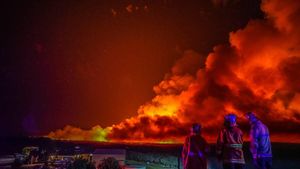U.S. President Donald Trump proposed on Tuesday what many are calling one of the most audacious plans yet for the Gaza Strip, envisioning U.S. ownership and redevelopment of the war-torn territory. Speaking at a joint press conference alongside Israeli Prime Minister Benjamin Netanyahu, Trump stated, "The U.S. will take over the Gaza Strip, and we will do a job with it too." This radical suggestion includes permanently resettling Palestinian residents to neighboring countries, implying it might even occur against their will.
Trump made his remarks as part of his vision to turn the damaged enclave—home to nearly two million Palestinians—into, as he called it, "the Riviera of the Middle East". With the backdrop of the first phase of fragile ceasefire talks between Israel and Hamas, Trump declared, "We will own it and be responsible for dismantling all of the dangerous unexploded bombs and other weapons on the site." This announcement has stirred alarm on both sides of the political aisle.
During the press conference, Trump stated he believed resettling displaced Gazans outside the territory was not only necessary but also a feasible long-term solution. "You look over the decades, it’s all death in Gaza. If we can get a beautiful area to resettle people, permanently, where they can be happy and not be shot or killed, this is what we need to aim for," he emphasized.
While Trump’s comments seemed to rally support from some of the hard-right factions within Netanyahu's coalition, significant pushback arose from various political leaders and constituencies. Responses ranged from disbelief to outright condemnation. Senator Chris Coons, a Democrat from Delaware, expressed shock, stating, "It’s insane. I can’t think of a place on Earth...where any positive outcome is less likely." His sentiments echoed the feelings of many, who viewed Trump's proposal as not only unrealistic but dangerous.
Senator Lindsey Graham, typically one of Trump’s staunch supporters, decried the idea as "problematic" and unsure how it could be received by the Arab world. On the opposite end of spectrum, Democratic lawmakers, including Rep. Rashida Tlaib, openly criticized Trump's suggestions as tantamount to "ethnic cleansing".
Notably, even among Trump’s own party, reactions were mixed. For some Trump allies, supporting the proposal contradicted the historical U.S. approach emphasizing peace through two states. Former Republican Rep. Justin Amash voiced strong opposition, equipping the consequences of Trump's plan with accusations of fueling chaos and undermining democratic values.
Beyond U.S. politics, the proposal has faced severe critique from Palestinian officials and organizations. Sami Abu Zuhri, senior Hamas spokesperson, rejected the notion entirely, framing it as "a recipe for creating chaos" and asserting, "Our people...will not allow these plans to pass. What is required is an end to occupation and aggression against our people, not their expulsion from their land." This sentiment captures the broader resistance felt by Palestinians who perceive such proposals as direct threats to their existence and rights.
The broader international response has been overwhelmingly negative. Governments and organizations within and outside the Middle East have condemned Trump's comments, reinforcing their longstanding opposition to forced resettlement or displacement of Palestinians. The Saudi government's statement exemplified this stance, stating its commitment to supporting Palestinian sovereignty and rejecting any displacement from Gaza.
Despite the negative reactions, Trump remained resolute. He suggested there was potential support from unnamed leaders throughout the region, claiming, "This is not a decision made lightly...everybody I’ve spoken to loves the idea of the United States owning this piece of land." While such assertions may be hitting the headlines, they are not substantiated by any regional allies who have issued denials of any agreement or support for his plan.
Experts observing the situation note the complex dynamics at play, particularly as Netanyahu is under mounting pressure to deliver results amid his legal challenges and increasing public frustrations back home. The coinciding moment—with Trump's return to the global stage—creates both intrigue and uncertainty about how U.S. foreign policy will evolve moving forward.
Entering the second phase of Israel-Hamas negotiations, U.S. involvement and Trump's drastic suggestions could shift the political tides once more, yet at the risk of exacerbated regional tensions and potential violence. Comments such as Trump’s not only risk the integrity of international diplomatic norms but also challenge the delicate balance of power long established between Israelis and Palestinians.
Trump's declarations ushered in both fervent support and harsh criticism, but as discussions progress, what remains clear is the potential far-reaching consequences of these proposals—where the fate and future of Gaza’s people now rest on the unpredictable chessboard of international relations.



